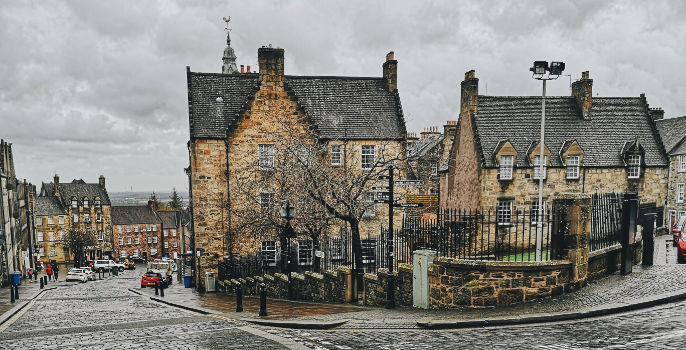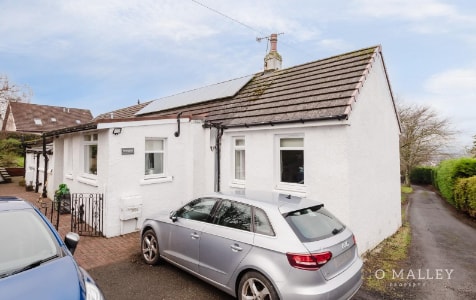If you’re in the position of having a second property on your hands, or a house that you don’t need to live in right now, then you face something of a dilemma. It’s a fairly nice dilemma to have, of course, but you still have to decide exactly how you’re going to turn the potential benefit of a house – i.e. the cash which is tied up in the bricks and mortar – into capital you can actually get your hands on. In simple terms, you have two options – you can sell the house or you can rent it out. In this article we’ll look at the reasons why you might choose either one of these options and, in particular, exactly what letting a property as a landlord involves.
What To Consider
The factors you need to look into before making a definitive choice between selling and renting out include the state of the housing market in Scotland as a whole and your local area in particular, meaning the kind of prices being fetched for similar properties and the amount of time it is likely to take to sell the house. The last of these – the time it could take to sell the house – is important in two respects. Firstly, and most obviously, the longer it takes to sell the house the more of a wait you’ll have until you can use the money generated for whatever purpose you have in mind.
Secondly, if, as is often the case, the house in question has been inherited, then a longer period between inheriting the property and selling it will make it slightly more likely that you’ll have to pay Capital Gains Tax (CGT) on the transaction. Without getting bogged down in more complex calculations, CGT could be due on any increase in the value of the house between the time it was inherited and the time of the sale (once any investment in the property has been taken into account).

The Scottish Housing Market
One thing which needs to be understood about the housing market is that it is in a constant state of flux. The situation at any particular moment is only ever a snapshot. For this reason, when weighing up selling or letting, you need to look at the state of the market at the present date and how it has moved over previous years. According to figures published by HM Land Registry in April 2024, the average price of a property in Scotland is £188,000, and the change over the 12 months leading up to this date was an increase of 5.6%. Interestingly, this figure is higher than the wider UK average, which was a 0.2% decrease over the same 12 month period.
The Bigger Picture
Over a longer timescale, according to Statista, the average house price in Scotland had risen by 35.8% in the time since 2015. In terms of how long it is likely to take to sell a property, the Scottish market is also currently performing more positively than the wider UK market. Figures published in Today’s Conveyancer show that the average time taken from the owner of a house instructing an estate agent that they wish to sell, to the sale actually going through, is 159 days in England and Wales (a 9% increase on 2022) and just 70-90 days in Scotland.
Statistics collected by Rightmove paint an even more positive picture of the Scottish housing market, albeit these look at the time taken to find a buyer, rather than for the sale to be completed. According to these figures, nine of the top ten quickest housing markets in the UK are located in Scotland, with Carluke coming top with an average time of 24 days to find a buyer. In Falkirk it is 26, Larbert, Troon and Port Glasgow 27 and Irvine 28. Across Scotland as a whole, the average time to find a buyer of 43 days compares positively to 71 days for the UK as a whole and 73 days for London and the South East.
Making A Decision
Of course, even the most positive long-term trends can be shifted off course by temporary aberrations. When interest rates rocketed in September 2022 following the infamous Liz Truss mini-budget, it had a dramatic cooling effect on both activity within the housing market and the prices being fetched by houses. Making a decision between selling and letting during a more unstable period such as this could mean you feel more inclined to opt for renting the property out, at least until the market has stabilised.

A Strong Market As An Incentive For Renting Out
Alternatively, the underlying strength of the housing market in Scotland could, counter-intuitively, offer an incentive for letting a property, rather than selling. The logic behind this position is that, if you’re not in a particular rush to release the capital contained within the house, then you could let it for a period and enjoy any rental income relatively safe in the knowledge that when the time finally does come to sell, you would be likely to be doing so against a positive wider backdrop.
Indeed, you could wait to sell the house until the market conditions were as positive as possible – i.e. after any temporary negative blips have worked through the system. This argument is particularly strong if you initially inherit a property and make the initial decision during a period in which the market is more depressed.
Why Sell?
The arguments for selling a house rather than renting it out are relatively simple, and often relate to more practical circumstances than considerations of the housing market or wider economy. It could be, for example, that you need the money from the sale to purchase a new property or that you simply don’t have the time or inclination to deal with the many complications involved in being a landlord.
Alternatively, you may have owned the second home for some time and seen the value rise significantly, and believe that now is the right time to cash in on that increase. In general, selling a second house rather than renting it out is the simpler option, not least because it comes with a definitive end-point when the sale is completed.
Why Let?
Letting a property, in contrast, is an on-going process, and reasons for choosing this option might include the fact that the market is currently showing a downward or static trend, meaning the sale could take longer and fetch less than you’d ideally like.
If it’s a case of moving in with a partner you may want to keep your own property as a safety net in case things don’t work out, or as a way of having an additional income stream. Alternatively, you may be moving away from the area in question – perhaps to work elsewhere, for example – but want to retain ownership of the property for when you finally move back, while also enjoying an income from the house rather than leaving it standing empty.
As mentioned previously, you may have inherited a second property, and letting will give you regular income while keeping your investment intact.

The Rental Sector In Scotland
If you’re in the fortunate position of not needing the money released by selling the house then you may opt to retain it as an asset, utilising the rent generated as a longer term income stream, or perhaps to invest in further properties. Statistics published by the Office for National Statistics (ONS) paint a picture of a vibrant Scottish rental sector. Despite a cap being introduced on rental increases within existing tenancies, private rental prices in Scotland increased by 6.8% in the 12 months leading up to January 2024, up from 6.3% to the 12 months up to December 2023. This is the highest annual rate since the data began to be collated in late 2022. According to HomeLet’s, the annual inflation for new tenancies in Scotland has risen from 3.7% in the 12 months leading up to May 2021, to a peak of 15.8% in the 12 months leading up to July 2023. In the 12 months leading up to January 2024, the rate had slowed somewhat to a still robust 8.0%. According to a quarterly report published by Citylets in March 2024, the time taken for a private property to let across Scotland had slowed slightly to an average of 28 days. Within these figures, 22% of properties were let within a week and 65% within a month.
The fact of the matter is that the reasons for choosing selling or letting will vary from case to case, but if rising rental yields and underlying strong demand for properties tempts you to opt for renting out as an option, it’s important to have a firm understanding of what the process involves.
The Process Of Letting Your House
Register – to become a landlord you need to register with the local council covering the area where the house is located. Failure to register is a criminal offence and could leave you liable for a fine of up to £50,000. To apply for landlord registration, visit the Scottish Landlord Register website or contact the housing department of the relevant council. There is a small fee involved – an £80 principal fee and an additional fee of £18 per property. You can apply for a discount if you own more than one property in a local authority area, or have a House of Multiple Occupancy (HMO) licence. Exemptions to the laws on registration include holiday lets, houses managed by religious orders, houses with a resident landlord and people letting to family members.
Landlord accreditation – accreditation is not a legal requirement, unlike registration, but it could make tenants more likely to rent from you than from non-accredited landlords. That’s because becoming accredited means that you have met, or are working to meet, the standards set out by Landlord Accreditation Scotland. Basically, it represents a quality mark for you as a landlord, and some councils operate their own scheme or work in partnership with Landlord Accreditation Scotland.
Lenders and insurers – if the house in question is inherited then there probably won’t be a mortgage to consider, but is there is a mortgage on the house then the terms of that mortgage may change once the house is rented out. Some lenders, for example, place restrictions on who the house can be let to, and in some cases on renting it out at all, and renting out without discussing it with the lender could represent a serious breach of contract. Renting the house out may also impact on any existing contents and building insurance, so you need to contact your insurers to discuss the terms of your insurance.
Responsibilities – you may opt to employ a letting agent to carry out many of the duties involved in renting your house out, but should be aware that you as the landlord remain legally responsible for these duties. If any legal action arises due to a failure to meet your legal responsibilities, it will be you, not the letting agent or property management service, who is held responsible.

Speak To An Expert
The outline of the process of letting out a house provided above is relatively brief and yet still underlines exactly how complex the process can be. Working with experts such as those at O’Malley Property will remove much of the stress and hassle from the process, as well as making sure that you meet all of your obligations at every point.
You also need to be aware of any impact the income from renting the property out will have on the amount of tax you pay and any benefits you might receive. Ask yourself if the rental income you’re hoping to generate will be sufficient to cover ongoing costs of maintaining the property at the same time as generating a worthwhile return.
It’s also important to know that you could cope with rental voids – cases in which no rent is coming in because you are between tenants or an existing tenant has fallen into arrears. For an inherited property with no mortgage this might not have a massive impact, unless you depend upon the rental income for other purposes, but if your second home still has a mortgage you will need a contingency for covering payments if rental voids occur.
Whether you opt for a quick sale, long term letting or a fixed period renting the house out, it’s a decision which is best taken after consulting experts in the Scottish property market and weighing up all of the pros and cons.


